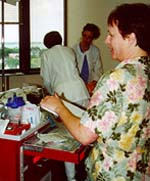
Return to Main Menu |
Ambulatory
care takes a day for training
Annual mandatories due again? Try a new approach. That’s what the
Rutledge Tower clinical ops coordinators did in Ambulatory Care Services.
 Nurses
in Ambulatory Care Services respond to a mock mayday that simulates the
procedures to be taken in a real emergency. Nurses
in Ambulatory Care Services respond to a mock mayday that simulates the
procedures to be taken in a real emergency.
This new approach was the brainchild of Cindy Kicklighter and involved
turning the usual tedious two months of scheduling mandatories into a one-day
training extravaganza. The clinical creation and design was fully supported
by a team of her peers, Sharon Vendrick and Lisa Murphy.
There was so much enthusiasm about the idea that clinical manager June
Darby was only too happy to clear the way with an approving “go” decision.
This clinical team led the way and recruited the collaborating efforts
of the Performance Improvement and Staff Development Department, M.E. Canaday,
Susan Hamner, Jackie Lacey, Sue Cammer and, new to the team Linda Randazzo.
Organization and impeccable detail would be needed to pull off this
feat. Processes included everything from coordinating and securing schedules
for training instructors, obtaining equipment, through to implementation
and follow-up of various classes.
Major players participating in this all-day activity were RNs, LPNs,
other clinical and administrative staff from med-surg clinics, RT 136,
RT 160, and ancillary at RT. The training options were so varied that staff
members could train in one class at a time, half the day, the whole day.
Pool nurses were scheduled to be present, and there were those who even
stayed late after working a night shift. By days end nearly 200 staff members
were trained.
What kept them coming? Of course putting mandatories behind them for
the year. Or was that it?
Could it have been that there was an N-95 mask fit-testing station
and another station for conscious sedation competency? OSHA briefings
seating nearly 40 at a time were a hit and there was also a one-to-one
review of pain management.
Kicklighter’s vision was clear; if we build it they will come. Add
other training opportunities that allow the practice of skills, like, IV
push and mock maydays to the mandatory routine and they will come. The
expertly simulated mock maydays included patient scenarios affording the
opportunity for everyone to participate using crash carts, EKG strips,
ambu-bags, and oxygen tanks. You name it, they thought of everything.
It is important to keep up skills that for some may not be utilized
very often. This concept keeps the whole clinical and administrative team
up to speed and working together.
Timing is everything. Graduation day at MUSC has typically been used
by Ambulatory Care for education purposes because many of the clinics are
closed to accommodate parking for the graduates and guests. So they
took full advantage of this opportunity to blitz as many staff members
through mandatory training as would be interested in participating.
The turnout was great, and, as noted by Mary Elizabeth Canaday, “Getting
the bulk of the required training done this way in one day makes it fun
and interactive and then it’s not nearly the chore it used to be to get
the rest of any scheduling done.”
It was more than obvious by the turn-out and enthusiasm alone that
this staff knows that their first responsibility is to patient care. What
better way to exhibit that than to maintain and sharpen skills.
|



 Nurses
in Ambulatory Care Services respond to a mock mayday that simulates the
procedures to be taken in a real emergency.
Nurses
in Ambulatory Care Services respond to a mock mayday that simulates the
procedures to be taken in a real emergency.